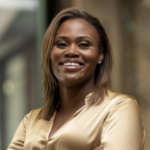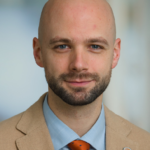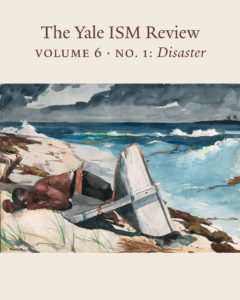Lisa L. Thompson & Andrew Wymer; Mark Roosien, host
(The transcription below has been significantly edited for length)
Mark Roosien: Hello, and welcome to a special conversation from the Yale ISM Review. I’m so pleased to be joined today by two distinguished guests, Reverend Dr. Lisa Thompson and Reverend Dr. Andrew Wymer. Today, I’m inviting Dr. Thompson and Dr. Wymer to have a conversation with me about preaching during disaster: specifically, the twin pandemics of COVID-19 and racism in American society. Lisa and Andrew, welcome.
Lisa Thompson: Thanks so much, Mark.
Andrew Wymer: Thank you.
MR: Lisa, both as a preacher and as a hearer, what are some things you’ve learned about pandemic preaching, and what kinds of things might you take away from this time as you prepare to enter a post-COVID reality?
LT: I’ve learned that preaching is the same as it was pre-pandemic in some ways–and very different. There are some folks who are willing to pivot more than others, and some people who like doing the same thing over and over. But what I’ve learned most is that things work best when we are nimble, when we are willing to do something different and remember what we’re there for. So [for example] maybe this Sunday sermon or Saturday or Friday sermon isn’t the one-directional thing we usually do in the pulpit; but maybe it’s more of a dialogue. Maybe it’s more of a conversation or a story.
AW: I want to ask: whose pandemic are we talking about? Because this pandemic and its manifestations have been so unequal. As a researcher who tries to attend to whiteness critically, I’m engaging QAnon–a white supremacist ideology and conspiracy theory—and how that’s manifesting in preaching. And then I attend church and I hear messages of liberation and the pursuit of social justice for marginalized persons, and that’s also pandemic preaching! So there are different pandemics, different experiences of this pandemic.
This illustrates the intense moral and ethical flexibility of preaching—and it’s been that way through the history of our country—and the role of the preacher in casting a vision for society. It’s not just a theological or a spiritual vision, but also a political and economic and social vision for an alternative future.
MR: Lisa, in your book, Ingenuity: Preaching as an Outsider, you stress the importance of the body in the preaching event, both in terms of the community’s expectations of the preacher and their body, and also the preacher’s accountability to the lived experiences of the people in their embodied experience. And with Zoom church and restrictions on gathering, we’ve all had a lot less contact with other bodies both in our daily lives and also in the preaching event. So, to ask a two-part question, how does the screen-mediated reality of pandemic preaching affect the preacher in this work of seeking to address bodily experience, and what are some ways to connect?
LT: Yes, I talked a lot about the body, preaching being a bodily encounter. We do it through the body; it lands on the body; it is an embodied experience. It’s not just cognitive. So when I talk about the body, I’m really thinking about lived experiences: we are interpreted through our bodies every single day–when we walk on the street, as we live in the world. Just as Andrew said: whose pandemic? and which pandemic, or which endemic, is ongoing? This is a call for preachers to be aware of lived experiences for every single sermon.
I was shocked and not shocked when we moved into the pandemic and the question was, “What should we do? There’s a crisis afoot!” Well, some people have always lived in crisis. There are some lived experiences that we’ve had the privilege to not live in awareness of—whether that’s because of ableism, sexism, whatever our bodily experiences are—some people who actually live in crisis, all the time.
My call is for the preacher to be more aware of those lived experiences. So that does involve looking at the news, paying attention to what’s happening in the world, being in conversation with your congregants or friends, and other people. Broadening the table of who you’re in conversation with really helps the preacher remain accountable to the lived experiences on the ground. But the preacher also has to be clear about their ethical lens for preaching: what are we doing it for? What are we accountable to? And what are we here to promote? In talking to preachers, my go-to line is: What actually promotes life in the midst of our community and in our world, as opposed to hate and death?
MR: Andrew, one of the themes in your work is the notion of silence: paying attention to what is not said at the pulpit and paying attention to what preachers are silent about. Silence can be something that’s regenerative, but it can also be something that’s oppressive. So I’d like to ask you to speak a little bit about the social function of silence, both in preaching and even more broadly.
AW: I engage silence as an expression of language (folk, historically, generally have treated silence as a lack of language) and I emphasize it as language that’s embedded with a complex variety of meanings. Our social locations–the way that we’re embodied, the way that society puts us into certain boxes, the biases that are formed in us, our experiences—they inform how we hear and deploy silence.
This is intensely political: Who is silent? Who’s forced to be silent? Who is not heard or intentionally not heard? Who can choose to be silent based on a position of power?
A significant portion of my research has been focused on the impact of white supremacy on preaching. To get at that is difficult. The classic example of this is Dr. King’s “Letter from Birmingham Jail,” where he says, the greatest stumbling block to civil rights is not the Ku Klux Klan or the white politician, it’s the silent—and I don’t think Dr. King used this language, but essentially—the silent white moderate.
So my work is focused on unpacking that silence, interpreting it, trying to listen to it as an expression of domination…White folk, who through white normativity and white privilege, haven’t had to listen to that, haven’t had to be aware of that.
Silence is not always silent. Silence can be very noisy. I think of the noise, just the collective noise, that’s been produced by white preaching over the last centuries in the context of our country, and yet [it’s] incredibly silent! There’s misdirection: you can have sermons on grace or love–even sermons on justice–that are actually misdirections away from a reckoning with, say, our racial formation and our racial identity and white supremacy.
LT: Jacqueline Woodson is a writer who has come up on the New York Times bestseller list in the past couple years, and she has a memoir called Brown Girl Dreaming. There’s a brief poem [in it] called “Silence.” And her premise is that there is a story, even in the silence, if you listen. So, as Andrew was talking about, silence is actually a language.
Whatever we perceive to be at stake either moves us to give voice or moves us to a place of empathy, or even outrage. I think part of the push is for preachers and communities of faith to recognize, to be more empathetic in their listening. Sometimes, yes, they need to be moved to silence, but also to be more empathetic, so they can actually move to voice on behalf of others or in conversation with others.
MR: Andrew, what are some of the things that preachers and congregations can do to create equity and equality in and from the pulpit?
AW: It’s very important to be humble about the limitations of the pulpit, the possibilities of the pulpit, and to understand the pulpit as existing holistically as part of a congregation’s life. In my context, particularly with white-dominant institutions and folk, we have to continually address the who that is in the pulpit, and we have to address the who that is in the pews.
We have to do this on a daily basis, uncovering the ways that we have been formed, since the very beginning of our lives, into patterns of domination. And as we address the who, we begin to address the communal who. Who are we? What are our commitments? Who are we preaching for?
I think this is the hardest work: uncovering the domination that’s formed inside of us, that’s working on a subconscious level oftentimes, shaping how we engage the congregation, shaping how the congregation engages the preacher, shaping how we engage God, shaping how we engage the biblical text.
This relates to any expression of domination: I mentioned race, but also gender, class, sexuality, ageism, ableism. Though as we do this, as we begin to address who we are, there’s the potential for the pulpit to be a resource in speaking into that conversation. And I think that the preacher can greatly help the process of uncovering domination, and then redirecting us, re-centering us, around more just futures.
It’s important for the preacher to have spiritual disciplines that engage how you’re embodied, and that they lead you, on a daily basis, to reckon with the ways you’re formed into domination.
It’s important professionally to sit and learn theology, hermeneutics, etc. from folk who are embodied differently. For many pastors and preachers, it’s not realistic to go back to seminary. But you can still buy a book and sit and learn from someone who is embodied differently and who has different experiences, different assumptions about the world.
Something I greatly encourage my students to do is to check the voices. Who are you bringing into the pulpit with you? Who are you centering in that moment? Do they all look like you? Are they embodied the same way as you? And are you not just tokenizing them, but are you truly letting them subvert your own embodiment and shape the structure of your message?
MR: I just have one last question for both of you and we’ll start with Lisa. This past year has not been easy for anybody, but it’s been harder for some folks more than others. And it’s not been easy for preachers! What are some ways that you would encourage preachers to take care of themselves, both personally and for excellence in their task?
LT: It’s not all on the preacher. If we’re willing to assess our theological assumptions about authority in preaching, there is a type of freedom that happens, and a type of loosening that can happen. If we can recognize that the onus of the preaching moment and the overall formation in the community is not solely on the preacher, it gives us a bit more freedom to be vulnerable, to be honest about when we need a break, what break we need, when we need additional conversation partners.
We have a colleague Richard Voelz who, during this season, has recommended to have people drop in to preach for you. Why do you have to tune into your service every week, you know? This is a chance for communities and congregations to come together. Get a break. Catch a break. Find a colleague who’s preaching and decide to do a shared worship encounter.
My honest encouragement is for people to really pay attention to what their bodies are telling them. I think that’s one of the things that we have not done well throughout the pandemic. We’ve not paid attention to when our bodies are screaming “no, no more!” but we’ve continued to push. So my greatest recommendation is to listen, and know when to take the break. We work better from rest than working to rest. Excellence in the practice does come from rest. We can’t do our best work when we’re constantly fatigued.
And finally, I’ll say, build a schedule! One of the saving graces for me has honestly been time-blocking my entire week. We can build in buckets of time for rest, for work–whether it’s preparation for the sermon or whatever the day-to-day task is. Seeing it on the calendar and on the schedule helps the preacher know that you’re actually working on it along the way. It might not be 10 hours today, but an hour yesterday or 30 minutes and it adds up.
AW: I resonate with a lot of what Lisa had to say. I want to go back to humility. My colleague Gennifer Brooks talks about humility as thinking of yourself rightly. You don’t think too highly of yourself–but also not too low of yourself. Humility can take expression in checking yourself, and also healthy boundaries, in recognizing limitations and caring for yourself: these can be acts of humility.
In this season, when many churches are wanting to add programming to the pastor’s responsibilities instead of taking away programming, to be strategic is very important. As much as possible, avoid self-laceration. You are not perfect. You are learning to do your best in a new medium, in intensely difficult circumstances. Don’t put that demand for perfection on yourself. Don’t let anyone else put that on you. And don’t wound yourself over where you have made mistakes or there’s slip-ups.
MR: I want to thank both of you for creating the space in your schedules for this conversation. On behalf of the Yale ISM Review, I hope you all have a great rest of the semester and thanks, once again, Dr. Lisa Thompson and Dr. Andrew Wymer.
LT: Thank you so much for the invitation. It was so good to be here with both of you.
AW: Thank you, Mark, and thank you, Lisa, as well.
 Lisa L. Thompson is Associate Professor of Black Homiletics and Liturgics at the Divinity School and Graduate Department of Religion of Vanderbilt University. She holds a Doctor of Philosophy and a Master of Arts in Religion from Vanderbilt University, and prioritizes discussing the ways religion can be used for the destruction or uplift of our life together. Her most recent publication is entitled Ingenuity: Preaching as an Outsider (Fall 2018); her book Preaching the Headlines releases in Fall 2021 with Fortress Press. Full bio available here: https://divinity.vanderbilt.edu/people/bio/lisa-l-thompson.
Lisa L. Thompson is Associate Professor of Black Homiletics and Liturgics at the Divinity School and Graduate Department of Religion of Vanderbilt University. She holds a Doctor of Philosophy and a Master of Arts in Religion from Vanderbilt University, and prioritizes discussing the ways religion can be used for the destruction or uplift of our life together. Her most recent publication is entitled Ingenuity: Preaching as an Outsider (Fall 2018); her book Preaching the Headlines releases in Fall 2021 with Fortress Press. Full bio available here: https://divinity.vanderbilt.edu/people/bio/lisa-l-thompson.
 Andrew Wymer serves as assistant professor of liturgical studies at Garrett-Evangelical Theological Seminary in Evanston, Illinois, and he is an ordained Baptist (ABCUSA) minister. Wymer’s research engages liturgical and homiletical theory and practice with attention to race and social justice, and he is the author of articles in the International Journal of Homiletics, Liturgy, Practical Matters, and Worship. https://www.garrett.edu/academics/faculty/andrew-wymer
Andrew Wymer serves as assistant professor of liturgical studies at Garrett-Evangelical Theological Seminary in Evanston, Illinois, and he is an ordained Baptist (ABCUSA) minister. Wymer’s research engages liturgical and homiletical theory and practice with attention to race and social justice, and he is the author of articles in the International Journal of Homiletics, Liturgy, Practical Matters, and Worship. https://www.garrett.edu/academics/faculty/andrew-wymer
